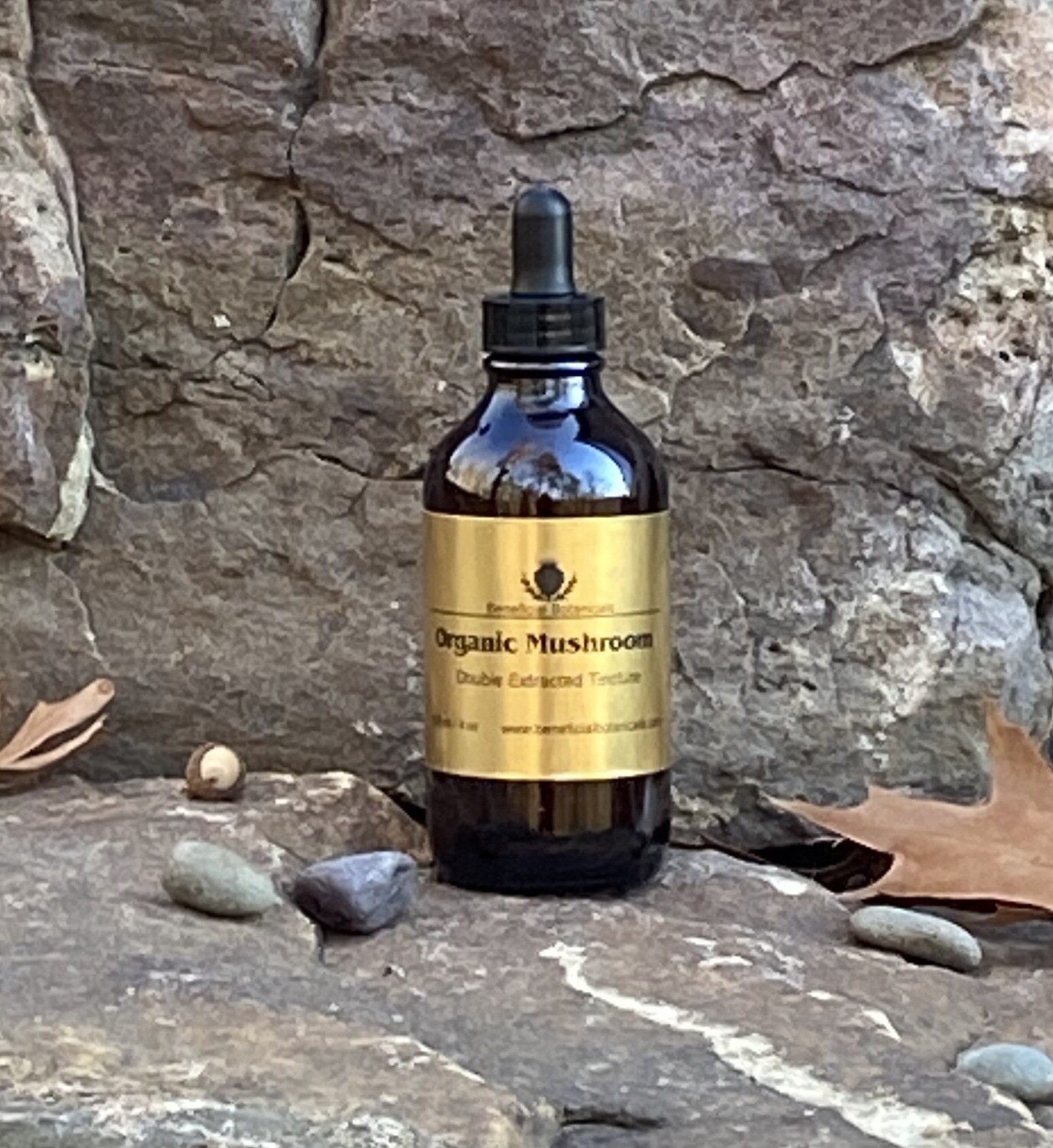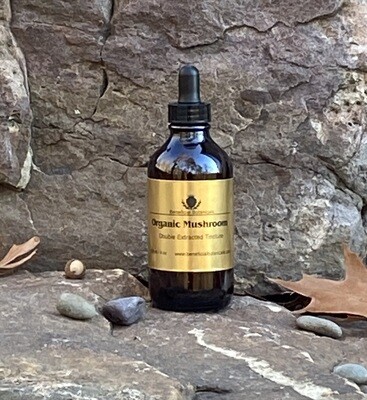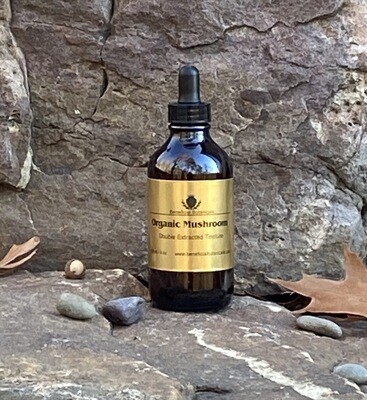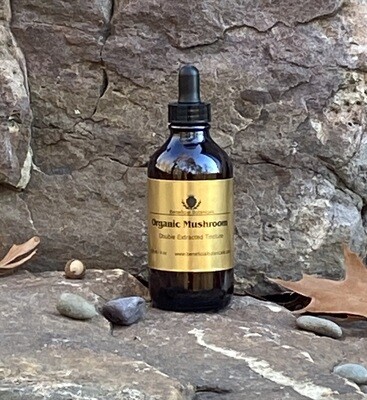Maitake Mushroom Tincture Dual Extraction
Label: Beneficial Botanicals
Botanical Name: Grifola frondosa
Other Names: Hen of the Woods, Sheep's Head, Signorina Mushroom
Parts Used: fruiting bodies (full spectrum)
Organic: yes, wild harvested from the base of oak trees
Origin: USA
Extraction Process: Double Extraction
Menstruum: organic food grade alcohol, spring water
Gluten Free: yes
Alcohol by Volume: 45%
[tab name="Overview"]
Like other polypores, Maitake contains polysaccharides that stimulate the immune system. As well as being identified to enhance the immune system, research has also indicated that whole Maitake may regulate blood pressure, glucose, insulin, and both serum and liver lipids, such as cholesterol, triglycerides, and phospholipids. One active constituent in Maitake for enhancing the immune activity was identified in the late 1980s as a protein-bound beta-glucan compound.
READ ABOUT INDICATIONS HERE
Maitake Mushroom Information
[tab name="Use / Dosage"]
Known Dosages (for Adults)
Dosage depends on the reason for use. General known dosage for this extract is 25-30 drops (approx 1/4 tsp) three times a day just before meals in a small amount of water or juice up to 6 weeks at a time.
[tab name="Precautions"]
Allergic reactions in rare cases have been reported.
Maitake mushroom might lower blood sugar levels. Your diabetes medications might need to be adjusted by your healthcare provider.
[tab name="References"]
1 Deng G, Lin H, Seidman A, et al. (September 2009). "A phase I/II trial of a polysaccharide extract from Grifola frondosa (Maitake mushroom) in breast cancer patients: immunological effects". Journal of Cancer Research and Clinical Oncology 135 (9): 1215–21. doi:10.1007/s00432-009-0562-z. PMID 19253021.
2 Kodama N, Komuta K, Nanba H (2003). "Effect of Maitake (Grifola frondosa) D-Fraction on the activation of NK cells in cancer patients". Journal of Medicinal Food 6 (4): 371–7. doi:10.1089/109662003772519949. PMID 14977447.
3 Kodama N, Komuta K, Sakai N, Nanba H (December 2002). "Effects of D-Fraction, a polysaccharide from Grifola frondosa on tumor growth involve activation of NK cells". Biological and Pharmaceutical Bulletin 25 (12): 1647–50. doi:10.1248/bpb.25.1647. PMID 12499658.
4 Kodama N, Asakawa A, Inui A, Masuda Y, Nanba H (March 2005). "Enhancement of cytotoxicity of NK cells by D-Fraction, a polysaccharide from Grifola frondosa". Oncology Reports 13 (3): 497–502. PMID 15706424.
5 Kodama N, Murata Y, Nanba H (2004). "Administration of a polysaccharide from Grifola frondosa stimulates immune function of normal mice". Journal of Medicinal Food 7 (2): 141–5. doi:10.1089/1096620041224012. PMID 15298759.
6 Fullerton SA, Samadi AA, Tortorelis DG, et al. (2000). "Induction of apoptosis in human prostatic cancer cells with beta-glucan (Maitake mushroom polysaccharide)". Molecular Urology 4 (1): 7–13. PMID 10851301.
7 Lin JT, Liu WH (October 2006). "o-Orsellinaldehyde from the submerged culture of the edible mushroom Grifola frondosa exhibits selective cytotoxic effect against Hep 3B cells through apoptosis". Journal of Agricultural and Food Chemistry 54 (20): 7564–9. doi:10.1021/jf0616762. PMID 17002422.
8 Cui FJ, Li Y, Xu YY, et al. (April 2007). "Induction of apoptosis in SGC-7901 cells by polysaccharide-peptide GFPS1b from the cultured mycelia of Grifola frondosa GF9801". Toxicology in Vitro 21 (3): 417–27. doi:10.1016/j.tiv.2006.10.004. PMID 17150327.
9 Gu YH, Belury MA (March 2005). "Selective induction of apoptosis in murine skin carcinoma cells (CH72) by an ethanol extract of Lentinula edodes". Cancer Letters 220 (1): 21–8. doi:10.1016/j.canlet.2004.06.037. PMID 15737684.
10 Konno S (2004). "Potential growth inhibitory effect of maitake D-fraction on canine cancer cells". Veterinary Therapeutics 5 (4): 263–71. PMID 15719326.
11 Konno S (March 2007). "Effect of various natural products on growth of bladder cancer cells: two promising mushroom extracts". Alternative Medicine Review 12 (1): 63–8. PMID 17397268.
12 Nanba H (September 1995). "Activity of maitake D-fraction to inhibit carcinogenesis and metastasis". Annals of the New York Academy of Sciences 768 (1): 243–5. doi:10.1111/j.1749-6632.1995.tb12130.x. PMID 8526356.
13 Kodama N, Komuta K, Nanba H (June 2002). "Can maitake MD-fraction aid cancer patients?". Alternative Medicine Review 7 (3): 236–9. PMID 12126464.
14 Nanba H, Kubo K (December 1997). "Effect of Maitake D-fraction on cancer prevention". Annals of the New York Academy of Sciences 833 (1 Cancer): 204–7. doi:10.1111/j.1749-6632.1997.tb48611.x. PMID 9616756.
15 Masuda Y, Murata Y, Hayashi M, Nanba H (June 2008). "Inhibitory effect of MD-Fraction on tumor metastasis: involvement of NK cell activation and suppression of intercellular adhesion molecule (ICAM)-1 expression in lung vascular endothelial cells". Biological and Pharmaceutical Bulletin 31 (6): 1104–8. doi:10.1248/bpb.31.1104. PMID 18520039.
16 "Maitake MD-fraction Mushroom Extract Therapy" www.resurrection-clinics.eu
17 Konno S, Tortorelis DG, Fullerton SA, Samadi AA, Hettiarachchi J, Tazaki H (December 2001). "A possible hypoglycaemic effect of maitake mushroom on Type 2 diabetic patients". Diabetic Medicine 18 (12): 1010. doi:10.1046/j.1464-5491.2001.00532-5.x. PMID 11903406.
18 Hong L, Xun M, Wutong W (April 2007). "Anti-diabetic effect of an alpha-glucan from fruit body of maitake (Grifola frondosa) on KK-Ay mice". The Journal of Pharmacy and Pharmacology 59 (4): 575–82. doi:10.1211/jpp.59.4.0013. PMID 17430642.
19 Kubo K, Aoki H, Nanba H (August 1994). "Anti-diabetic activity present in the fruit body of Grifola frondosa (Maitake). I". Biological and Pharmaceutical Bulletin 17 (8): 1106–10. PMID 7820117.
20 Lo HC, Hsu TH, Chen CY (2008). "Submerged culture mycelium and broth of Grifola frondosa improve glycemic responses in diabetic rats". The American Journal of Chinese Medicine 36 (2): 265–85. doi:10.1142/S0192415X0800576X. PMID 18457360.
21 Manohar V, Talpur NA, Echard BW, Lieberman S, Preuss HG (January 2002). "Effects of a water-soluble extract of maitake mushroom on circulating glucose/insulin concentrations in KK mice". Diabetes, Obesity and Metabolism 4 (1): 43–8. doi:10.1046/j.1463-1326.2002.00180.x. PMID 11874441.
22 Horio H, Ohtsuru M (February 2001). "Maitake (Grifola frondosa) improve glucose tolerance of experimental diabetic rats". Journal of Nutritional Science and Vitaminology 47 (1): 57–63. PMID 11349892.
23 Matsuur H, Asakawa C, Kurimoto M, Mizutani J (July 2002). "Alpha-glucosidase inhibitor from the seeds of balsam pear (Momordica charantia) and the fruit bodies of Grifola frondosa". Bioscience, Biotechnology, and Biochemistry 66 (7): 1576–8. doi:10.1271/bbb.66.1576. PMID 12224646.
24 Zhang Y, Mills GL, Nair MG (December 2002). "Cyclooxygenase inhibitory and antioxidant compounds from the mycelia of the edible mushroom Grifola frondosa". Journal of Agricultural and Food Chemistry 50 (26): 7581–5. doi:10.1021/jf0257648. PMID 12475274.
25 Lee JS, Park BC, Ko YJ, et al. (December 2008). "Grifola frondosa (maitake mushroom) water extract inhibits vascular endothelial growth factor-induced angiogenesis through inhibition of reactive oxygen species and extracellular signal-regulated kinase phosphorylation". Journal of Medicinal Food 11 (4): 643–51. doi:10.1089/jmf.2007.0629. PMID 19053855.
26 Nonaka, T; Y Hashimoto, K Takio (1998-07). "Kinetic characterization of lysine-specific metalloendopeptidases from Grifola frondosa and Pleurotus ostreatus fruiting bodies". Journal of Biochemistry 124 (1): 157–162. ISSN 0021-924X. PMID 9644258. Retrieved 2010-07-01.
27 Taouatas, Nadia; Madalina M Drugan, Albert J R Heck, Shabaz Mohammed (2008-05). "Straightforward ladder sequencing of peptides using a Lys-N metalloendopeptidase". Nat Meth 5 (5): 405–407. doi:10.1038/nmeth.1204. ISSN 1548-7091. PMID 18425140.
28 Aranaz P, Peña A, Vettorazzi A, Fabra MJ, Martínez-Abad A, López-Rubio A, Pera J, Parladé J, Castellari M, Milagro FI, González-Navarro CJ. Grifola frondosa (Maitake) Extract Reduces Fat Accumulation and Improves Health Span in C. elegans through the DAF-16/FOXO and SKN-1/NRF2 Signalling Pathways. Nutrients. 2021 Nov 7;13(11):3968. doi: 10.3390/nu13113968. PMID: 34836223; PMCID: PMC8620745.
[endtab]
photo credit: livingafield.com
These statements have not been evaluated by the Food and Drug Administration. The information provided here is intended to supplement, not substitute for, the expertise and judgement of your physician, pharmacist or other healthcare provider and should not be construed to indicate that the use of this herbal product is safe, appropriate, or effective for you. Consult your healthcare provider before taking this herbal product.




